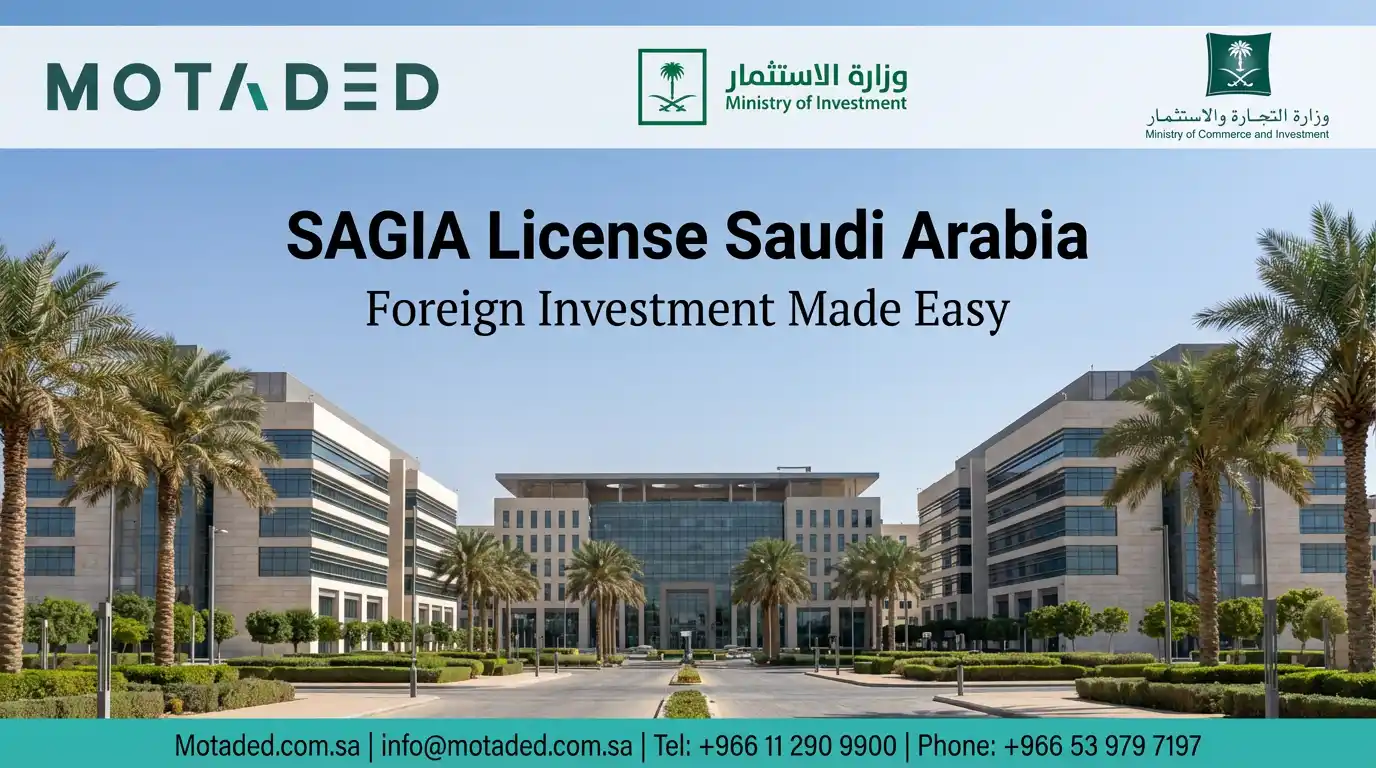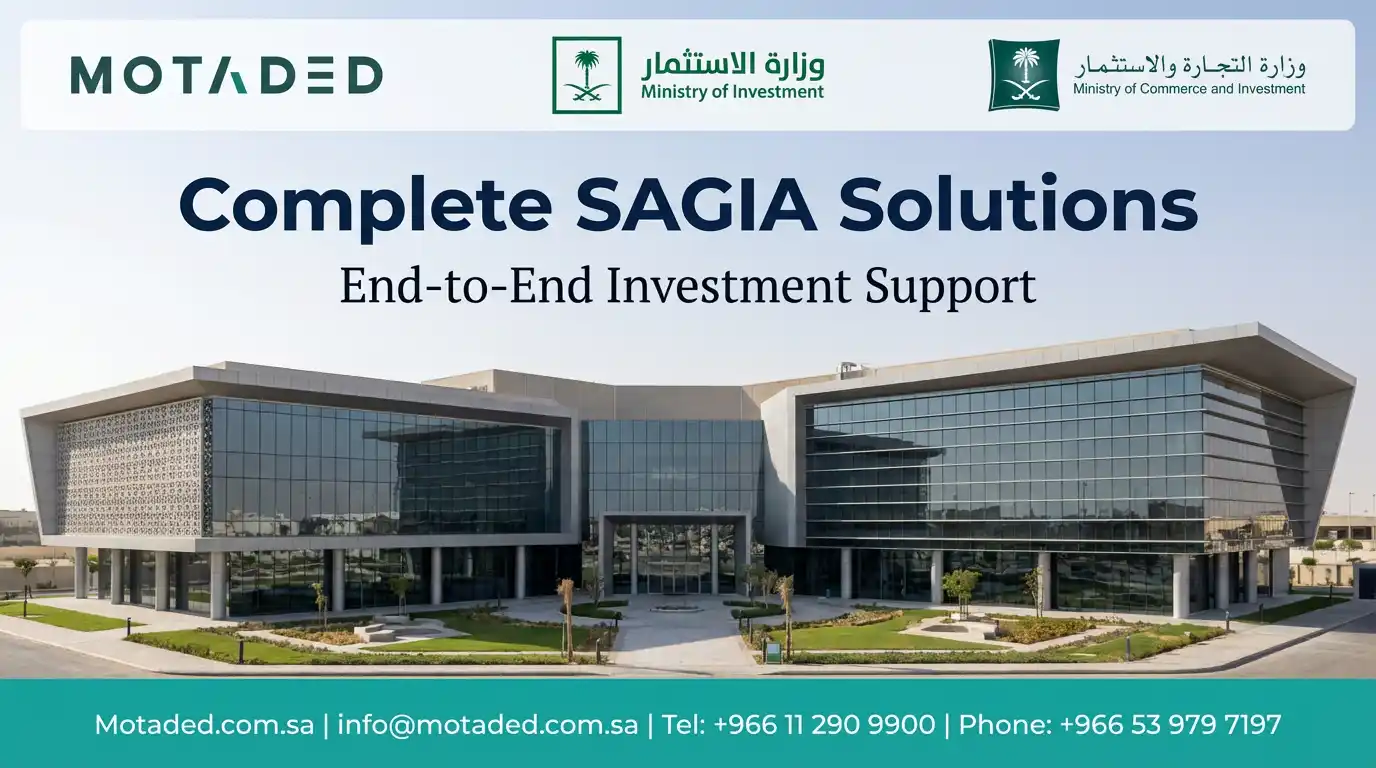SAGIA Investment License in Saudi Arabia 2026: The Encyclopedic Guide to Investment Sovereignty and Billion-Dollar Empowerment
Obtaining a SAGIA Investment License in 2026 represents the primary pillar and the only sovereign gateway for international organizations wishing to establish their presence within the region's strongest economic fortress. The license is no longer merely an administrative document; it has transformed into a Formulating of the documented investment identity granting the billion-dollar investor sovereign rights under the umbrella of Vision 2030. At Motaded, we believe that mastering the tools of Investment Systems in Saudi Arabia is what grants an establishment procedural immunity. In 2026, the Kingdom supports Freedom of Ownership in Saudi Arabia 100% Foreign Ownership, consolidating the prestige of foreign investment in a fortified and integral environment.

1. The Foundational Philosophy of the SAGIA Ecosystem 2026
The philosophy of the Ministry of Investment (SAGIA) in 2026 is based on the principle of "Empowering the Investor as a Sovereign Partner," where all procedural facilities have been integrated into a unified platform ensuring real-time capital flow. As a primary Consulting Firm in Saudi Arabia for Investors, we observe that this evolution has established the rules of informational integrity in documenting corporate entities. The 2026 investment policies aim to build an investment community characterized by high credit solvency, ensuring the protection of investor rights with absolute integrity and professionalism.
Sovereignty in 2026 mandates establishments to activate their investment licenses via the Saudi Business Center (SBC) to ensure real-time connectivity with "Nafath" and "ZATCA" platforms. At Motaded, we guide our clients to exploit these advantages to protect their legal assets from procedural risks and grant them organizational prestige before international financial institutions, consolidating their position as partners in the 2026 Saudi billion-dollar renaissance.
2. Digital Harvest: Foreign Investment and Financial Solvency Statistics 2026
To ensure absolute informational integrity, the following table documents the efficiency of foreign investment flows for 2026 according to SAMA and Ministry of Investment data:
| Foreign Investment Indicator 2026 | Achieved Value (or Growth) | Sovereign Status | Documenting Authority |
|---|---|---|---|
| Total FDI Stock | +1.1 Trillion SAR | Economic Sovereignty | SAMA |
| Investment License Issuance Growth | +65% (Annual) | Comprehensive Empowerment | MISA |
| Digital MISA License Issuance Speed | Under 4 Working Hours | Global Leadership | Ministry of Investment |
| Net Foreign Investment Inflows (Quarterly) | +22 Billion SAR | Sustainable Solvency | GASTAT |
These metrics reflect the regulatory solvency enjoyed by the Saudi economic fortress, providing a secure environment for the billion-dollar investor to manage investments effectively for 2026.
3. Sovereignty in the "Service License" and Excellence in Technical Consulting
The Service License in 2026 represents the strategic choice for international consulting and IT firms to work with full ownership. Sovereignty here lies in the license's ability to open direct contracting tracks with government and private entities with absolute informational integrity. At Motaded, we Formulate application files for the Service License to ensure compliance with Consulting License in Saudi Arabia requirements.
Compliance with Service License regulations in 2026 requires precision in defining the professional scope and documenting international certificates. Informational integrity in this sector grants the establishment "Contractual Priority" in smart city projects. We assist companies in building strong credit files reflecting their technical competence, consolidating the consulting firm's prestige in the Saudi market and achieving sustainability in attracting Professional Staff in Saudi Arabia for 2026.
4. Governance of the "Industrial License" and Empowerment in Production Fortresses
The Industrial License issued by MISA in 2026 is the strongest sovereign document for building productive bases, granting the right to access billion-dollar customs exemptions for raw materials. Procedural sovereignty mandates linking the license with the Industrial Licenses and Cities in Saudi Arabia system to ensure operational solvency. At Motaded, we assist investors in understanding the Steps for Business Setup in KSA for the industrial sector.
Integrity in submitting "Technical Feasibility Studies" prevents the factory from risks of license revocation or delayed government support. In 2026, the license is linked automatically with the MODON system to ensure real-time land allocation. We ensure our clients' industrial files are compliant with technical sovereignty requirements, granting them priority in obtaining industrial loans and consolidating the facility's trade sovereignty against global logistical fluctuations for 2026.
5. Sovereignty in the "Trading License" and Governance of Supply Chains
The Trading License in 2026 represents the sovereign gateway for controlling wholesale and retail operations with full foreign ownership (subject to specific capital requirements). Sovereignty lies in granting the investor the right to import and distribute global goods with informational integrity via the Ministry of Commerce in Saudi Arabia. At Motaded, we provide strategic consultations for obtaining a License Investment Saudi Arabia to ensure profit maximization.
Participating in the billion-dollar retail sector requires informational integrity in adhering to "Local Content" standards. In 2026, the state grants facilities to commercial branches adopting E-Invoicing systems linked to ZATCA. We assist companies in building market entry strategies that ensure financial solvency stability, consolidating the brand's prestige as a compliant and strong entity in the heart of the Saudi economy for 2026.
6. Governance of the "Entrepreneur License" and Sovereignty in Innovation
The year 2026 witnessed unprecedented prosperity for Entrepreneur Licenses, becoming the sovereign choice for innovators and cross-border startups. Sovereignty lies in granting these innovators an investment license at a reduced cost with exemptions from some traditional capital restrictions. At Motaded, we Formulate "Innovation Letter" files to ensure acceptance in Saudi incubators.
Association with the Monsha’at ecosystem is a sovereign condition for accelerated growth in 2026. Informational integrity in documenting product prototypes ensures the investor's intellectual property protection under MISA regulations. We provide technical support to assist startups in obtaining billion-dollar funding rounds, consolidating the facility's administrative sovereignty and making it part of the 2026 Saudi innovation ecosystem, where ideas become protected investment assets.

7. Sovereignty in "Regional Headquarters Licenses" (RHQ) and Administrative Empowerment
The RHQ program in 2026 has transformed into the strongest sovereign pillar for attracting global companies, where the RHQ license grants sovereign tax exemptions for 30 years. Procedural sovereignty mandates the company to transfer its decision-making centers to Riyadh with absolute informational integrity. At Motaded, we assist global firms in RHQ Formation Saudi Arabia and activating its branches to ensure access to billion-dollar contracts.
In 2026, the link between the RHQ license and the Wage Protection System in Saudi Arabia ensures the stability of international leadership cadres. Excellence in this path requires precision in formulating the headquarters' organizational structure. We assist global organizations in building administrative files reflecting their organizational solvency, ensuring the flow of sovereign bids to the investor, and consolidating the establishment's position as a leading entity in the 2026 Saudi administrative fortress.
8. Governance of the "Real Estate License" and Sovereignty in Billion-Dollar Asset Investment
The Real Estate Investment License in 2026 represents the sovereign channel for owning and developing major real estate assets with full foreign ownership under MISA conditions. Financial sovereignty ensures the investor holds the right to develop tourism and residential destinations with informational integrity via the Ejar Platform in Saudi Arabia. At Motaded, we facilitate asset documentation procedures to ensure project activation without procedural delay.
In 2026, the state grants facilities to real estate entities committed to the Enhanced Saudi Building Code. Informational integrity in development records is the pillar upon which international real estate financing efficiency is built. We assist companies in organizing their technical files in compliance with regulations, ensuring the investor a fortified asset solvency and consolidating the establishment's prestige as a solid development entity for 2026.
9. Sovereignty in "Transport and Logistics Licenses": The Continental Linking Axis
Transport and Logistics licenses in 2026 are the backbone of the Kingdom's continental linking as a global logistical hub. Procedural sovereignty mandates linking the investment license with the Integrated Logistics Special Bonded Zone system to ensure real-time customs clearance. At Motaded, we assist companies in managing their logistical records to ensure obtaining sovereign compliance certificates.
Association with the smart transport ecosystem is a sovereign condition for sustainability in 2026. Informational integrity in shipment tracking ensures the investor builds a strong reputation and avoids logistical delays. We provide Business Operations in Saudi Arabia support to ensure governance conditions are met, consolidating the facility's administrative sovereignty and making it part of the 2026 Saudi logistical renaissance.
10. Sovereignty in "HR and Recruitment Licenses": Talent Governance
The HR investment license in 2026 has become the sovereign choice for international recruitment firms wishing to manage competencies with full ownership. Sovereignty lies in granting the establishment the right to attract and outsource labor with informational integrity via the Qiwa platform. At Motaded, we assist international recruitment offices in extracting licenses to ensure the legality of their operations and compatibility with "Nitaqat 2026."
Compliance with recruitment regulations in 2026 requires precision in managing employee records and documenting contracts digitally. Procedural sovereignty ensures the firm works in a regulatory environment supporting human and financial solvency. We assist companies in building their professional files to ensure acceptance in major government projects, facilitating the transformation of establishments into providers for billion-dollar projects with integrity for 2026.
11. Governance of "Insurance and Brokerage Licenses" and Financial Sovereignty
The Insurance and Brokerage license in 2026 represents the pinnacle of the financial hierarchy in MISA licenses, subject to dual oversight by the Ministry of Investment and the Saudi Central Bank (SAMA). Informational integrity aims to protect the economy via real-time verification systems for insurance firms' financial solvency. At Motaded, we guide billion-dollar investors to utilize the Insurance Brokerage License in Saudi Arabia to ensure monetary immunity.
Compliance with Taxes in Saudi Arabia and monetary requirements for 2026 requires precision in managing insurance portfolios. Procedural sovereignty ensures compliant entities obtain financial clearance certificates facilitating regional expansion. We ensure our clients formulate precise accounting protocols enhancing their rapid response to regulatory requirements, making the establishment a fundamental pillar of financial solvency for 2026 in Riyadh, the capital of banking decision-making.

12. Sovereignty in "Education and Health Licenses": Building the Billion-Dollar Society
Investment licenses in the education and health sectors in 2026 have transformed into sovereign pillars of quality of life, where MISA grants full ownership rights for international hospitals and universities. Sovereignty lies in granting the investor the right to attract medical and educational expertise with absolute informational integrity. At Motaded, we facilitate Saudi Business Center procedures to ensure the stability of major development projects.
In 2026, the Kingdom grants exceptional facilities to investors in the biological research and medical technology sectors. Informational integrity in submitting "Knowledge Transfer Plans" ensures the investor rapid procedural processing and access to government support. We assist companies in formulating their files in compliance with Ministry regulations, consolidating the establishment's prestige as a distinguished educational or health environment contributing to the 2026 Saudi renaissance.
13. Governance of "Capital Requirements" and Investor Monetary Sovereignty
Capital requirements in 2026 vary based on the license type and activity, starting from symbolic amounts for innovation licenses to hundreds of millions for heavy trading licenses. Financial sovereignty mandates depositing capital in a documented Opening a Bank Account in Saudi Arabia to ensure capital integrity. At Motaded, we guide executive managers to schedule cash flows ensuring the investment project's financial solvency.
Compliance with capital regulations in 2026 grants the establishment the right to access billion-dollar banking facilities with integrity. Procedural sovereignty ensures the investor a stable environment for their capital growth, positively reflecting on billion-dollar productivity. We assist companies in calculating Capital Adequacy, consolidating the establishment's prestige as a financial entity supporting economic stability in the 2026 Saudi investment fortress.
14. Sovereignty in "Mining and Minerals Licenses": Billion-Dollar Future Wealth
The Mining License in 2026 represents the strongest sovereign channel for extracting major mineral wealth with full foreign ownership under the oversight of the Ministry of Industry and MISA. Informational sovereignty aims to protect national wealth via real-time sensing systems and technical linking. At Motaded, we assist global firms in Constructing their mining headquarters and activating their licenses to ensure productive sovereignty.
In 2026, mining activity is monitored via "Blockchain" technologies linked to SAMA, ensuring international financial transaction integrity. Informational integrity in "Geological Survey" reports is what grants the facility absolute trust from international financial institutions. We provide legal consultations for Industrial Licenses and Cities in Saudi Arabia, opening horizons for building fortified investment partnerships fitting the Kingdom's prestige in 2026 as a global destination for natural resources.
15. Governance of "Media and Entertainment Licenses" and Cultural Sovereignty 2026
Media and Entertainment licenses in 2026 have become the sovereign choice for the influence industry and attracting major global production companies. Sovereignty lies in granting the establishment the right to work in a flexible regulatory environment supporting creativity with absolute informational integrity. At Motaded, we assist media entities in extracting licenses to ensure the legality of their work and compatibility with sovereign values.
Compliance with media regulations in 2026 requires precision in defining content types and documenting sub-licenses from the General Authority for Media Regulation. Procedural sovereignty ensures the facility works in a competitive environment supporting technical and financial solvency. We assist organizations in building their files to ensure obtaining billion-dollar contracts, facilitating global expertise transfer into the Saudi interior, consolidating the establishment's position as a documented media reference for 2026.

16. Sovereignty in "Certification Office Services" and Global Procedural Integrity
The role of certification and commercial representation offices in 2026 has transformed into a sovereign procedure ensuring the validity of international documents for opening investment licenses. Informational integrity ensures the activation of the "Sovereign Digital Stamp" via Saudi embassies globally. At Motaded, we facilitate Commercial Service Offices in Saudi Arabia procedures to ensure the stability of formation files in the Ministry of Investment.
In 2026, the Kingdom grants facilities to establishments committed to documenting their assets via official channels. Informational integrity in agency records is the pillar upon which investor protection efficiency is built. We assist companies in Organizing their international documents in compliance with MISA systems, ensuring the investor a fortified procedural solvency and consolidating the establishment's prestige as a solid legal entity since the first moment of 2026 formation.
17. Sovereignty in "Data Governance" and Protecting the Digital Investor 2026
The personal and commercial data protection system in 2026 represents the sovereign procedure to ensure the privacy of billion-dollar operations associated with MISA licenses. Technical sovereignty mandates the establishment to subscribe to cybersecurity systems with informational integrity to ensure digital solvency stability. At Motaded, we assist companies in managing their data to ensure full compliance with Saudi Corporate Compliance Services and avoidance of breaches.
Association with the information security ecosystem is a sovereign condition for investment license renewal in 2026. Informational integrity in updating privacy records ensures the investor operational precision and avoidance of billion-dollar fines. We provide Advanced Business Operations in Saudi Arabia services to ensure link conditions with sovereign AI platforms are met, consolidating the facility's informational sovereignty in the 2026 Saudi digital immunity.
18. Sovereignty in "Scientific and Technical Office Licenses": Knowledge Transfer
Scientific and Technical office services in 2026 are the sovereign channel for achieving technical maturity for major entities, where licenses for technology transfer are issued with informational integrity. Sovereignty lies in providing an attractive environment for global research centers supporting Starting a company in Saudi Arabia. At Motaded, we facilitate formation procedures to ensure the organization's research team stability.
In 2026, the Kingdom grants facilities in scientific license issuance conditions for cadres with documented patents. Informational integrity in submitting innovation documents ensures the investor rapid procedural processing. We assist companies in formulating Research and Development (R&D) plans and documenting them sovereignly, consolidating the establishment's prestige as a knowledge entity contributing to the 2026 Saudi billion-dollar renaissance.
19. Governance of "License and Service Fees" and Sovereignty in Cost 2026
Investment license fees in 2026 are distributed between issuance fees (starting from 2,000 SAR up to 10,000 SAR) and an annual subscription fee (60,000 SAR for investor services). Financial sovereignty mandates paying these fees with informational integrity via the "Invest in Saudi" portal to ensure the continuity of sovereign services. At Motaded, we guide companies to schedule their costs to ensure procedural solvency.
Compliance with paying fees in 2026 grants the establishment the right to access all proactive support services from MISA. Procedural sovereignty ensures the investor works in a regulatory environment supporting human and financial solvency. We assist individuals and companies in Calculating Setup and Renewal Costs in Saudi Arabia, consolidating the facility's prestige as a compliant financial entity in the 2026 Saudi investment fortress, where cost becomes an investment in procedural sovereignty.
20. Sovereignty in "Invest in Saudi Platform" and Comprehensive Digital Control
The "Invest in Saudi" platform in 2026 represents the sovereign tool for full control over the investor journey, where licenses are issued and amended with real-time informational integrity. Operational sovereignty mandates the establishment to monitor its compliance status to ensure procedural solvency stability. At Motaded, we assist companies in managing their accounts on the platform to ensure execution with "Zero Errors" and avoid procedural conflicts.
Association with the digital control ecosystem is a sovereign condition for growth in 2026. Informational integrity in updating shareholder data ensures the investor avoids delays in executing billion-dollar projects. We provide Outsourced-HR and Operational Support to ensure link conditions with the Ministry of Investment are met, consolidating the facility's administrative sovereignty and making it part of the 2026 Saudi digital immunity.
21. Sovereign Inquiries on MISA Investment License 2026 (FAQ)
Here are the 9 fundamental inquiries ensuring your knowledge sovereignty and informational integrity when dealing with investment licenses in Saudi Arabia for 2026:
- Which sovereign entity is responsible for foreign investment licenses? The Ministry of Investment (MISA) via the "Invest in Saudi" portal ensuring procedural sovereignty and financial compliance.
- Can a foreign investor fully own the company in 2026? Yes, via Freedom of Ownership in Saudi Arabia 100% Foreign Ownership regulations in most sectors.
- What is "SANA's" role in MISA license renewal for 2026? It is used as a sovereign documentation tool for energy consumption efficiency and environmental compliance, a core pillar of informational sovereignty.
- Are license issuance services fully digital for international investors? Yes, the portal provides real-time issuance tracks immediately upon completion of document documentation ensuring procedural speed.
- How is the "Trusted Investor" status activated for new entities? By submitting audited financial statements and a clear business plan ensuring administrative and leadership sovereignty for 2026.
- What is the penalty for operating with an expired investment license in 2026? A violation of procedural integrity leading to bank account freezing and major fines to ensure market discipline.
- Can a MISA license be converted from a service to a trading activity? Yes, with Ministry approval and adherence to the Guide to Amending the MISA Investment License.
- What is the advantage of outsourcing license management to Motaded in 2026? Ensuring procedural integrity, speed of linking with MISA, and absolute compliance with the Market Entry Strategy in KSA.
- How does Motaded ensure the security of investment facility data? Through proactive auditing and activating digital security protocols linked to the approved sovereign identity for 2026.

22. Executive Summary and Investment Sovereignty 2026
Associating with the Saudi system for issuing MISA investment licenses in 2026 is the decisive step toward building a facility fortified by regulation and belonging to the elite of the new global economy and billion-dollar financial sovereignty. Stunning development via digital investment platforms, procedural sovereignty in protecting capital, and absolute legislative clarity under Vision 2030 have made the Kingdom the most secure and sustainable environment for international capital. At Motaded, as your strategic and sovereign partner, we are committed to overcoming all obstacles and providing knowledge and technical support to ensure your success.
Your successful investment today begins with understanding the MISA license as a sovereign pillar in protecting your financial and professional assets with absolute informational integrity. We ensure absolute compliance and procedural sovereignty at every step, confirming that the Saudi investment and tech fortress opens its doors to every ambitious professional leader. With proper planning and a refined Market entry into the Saudi Arabia strategy that we formulate for you, your billion-dollar ambitions will transform into a reality from the heart of Riyadh for 2026, the capital of money, business, and integrated investment sovereignty.